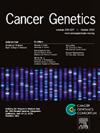Efficacy of pembrolizumab in MSI-high and BRCA-positive castration-resistant prostate cancer
IF 2.1
4区 医学
Q4 GENETICS & HEREDITY
引用次数: 0
Abstract
This report presents a rare case of metastatic castration-resistant prostate cancer (CRPC) in an adult patient characterized by dual molecular alterations: microsatellite instability-high (MSI-H) and a BRCA2 mutation. Despite initial treatment with castration, Abiraterone, and sequential chemotherapy with docetaxel and cabazitaxel, the patient progressed to CRPC. Genetic testing revealed MSI-H and a BRCA2 mutation, prompting pembrolizumab therapy. The treatment led to a dramatic prostate-specific antigen (PSA) reduction .
This case underscores the importance of comprehensive genomic profiling for advanced prostate cancer. MSI-H tumors often respond to immune checkpoint inhibitors (ICIs) such as pembrolizumab, while BRCA2 mutations are associated with poly(ADP-ribose) polymerase inhibitors (PARPi) sensitivity. This dual alteration presents therapeutic challenges, as evidenced by pembrolizumab’s remarkable efficacy in this patient, highlighting its potential as a treatment option for MSI-H and BRCA-positive CRPC. Moreover, next-generation sequencing (NGS) played a crucial role in identifying actionable biomarkers not detected by earlier BRCA analyses, emphasizing the necessity of thorough genetic testing.
Further research is needed to optimize treatment strategies for cases with coexisting MSI-H and BRCA mutations, including exploring the synergistic effects of ICIs and PARP i. This case demonstrates the promise of pembrolizumab and advances the understanding of genetic testing’s role in tailoring therapies for complex molecular profiles in prostate cancer.
派姆单抗在msi高和brca阳性去势抵抗性前列腺癌中的疗效
本报告报道了一例罕见的转移性去势抵抗性前列腺癌(CRPC)的成年患者,其特征是双重分子改变:微卫星不稳定性高(MSI-H)和BRCA2突变。尽管最初使用去势、阿比特龙以及多西他赛和卡巴他赛序贯化疗,患者仍进展为CRPC。基因检测显示MSI-H和BRCA2突变,促使派姆单抗治疗。该治疗导致前列腺特异性抗原(PSA)显著降低,这一病例强调了对晚期前列腺癌进行全面基因组分析的重要性。MSI-H肿瘤通常对免疫检查点抑制剂(ICIs)如派姆单抗有反应,而BRCA2突变与聚(adp -核糖)聚合酶抑制剂(PARPi)敏感性相关。这种双重改变带来了治疗上的挑战,pembrolizumab在该患者中的显著疗效证明了这一点,突出了其作为MSI-H和brca阳性CRPC治疗选择的潜力。此外,下一代测序(NGS)在识别早期BRCA分析未检测到的可操作生物标志物方面发挥了至关重要的作用,强调了彻底的基因检测的必要性。对于共存MSI-H和BRCA突变的病例,需要进一步的研究来优化治疗策略,包括探索ICIs和PARP i的协同效应。该病例证明了派姆单抗的前景,并促进了对基因检测在前列腺癌复杂分子谱定制治疗中的作用的理解。
本文章由计算机程序翻译,如有差异,请以英文原文为准。
求助全文
约1分钟内获得全文
求助全文
来源期刊

Cancer Genetics
ONCOLOGY-GENETICS & HEREDITY
CiteScore
3.20
自引率
5.30%
发文量
167
审稿时长
27 days
期刊介绍:
The aim of Cancer Genetics is to publish high quality scientific papers on the cellular, genetic and molecular aspects of cancer, including cancer predisposition and clinical diagnostic applications. Specific areas of interest include descriptions of new chromosomal, molecular or epigenetic alterations in benign and malignant diseases; novel laboratory approaches for identification and characterization of chromosomal rearrangements or genomic alterations in cancer cells; correlation of genetic changes with pathology and clinical presentation; and the molecular genetics of cancer predisposition. To reach a basic science and clinical multidisciplinary audience, we welcome original full-length articles, reviews, meeting summaries, brief reports, and letters to the editor.
 求助内容:
求助内容: 应助结果提醒方式:
应助结果提醒方式:


